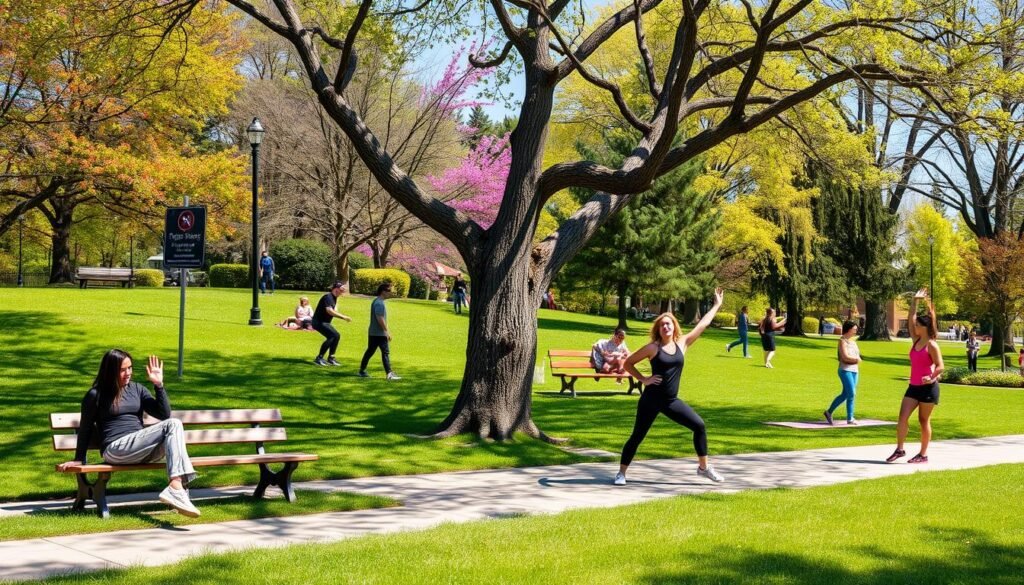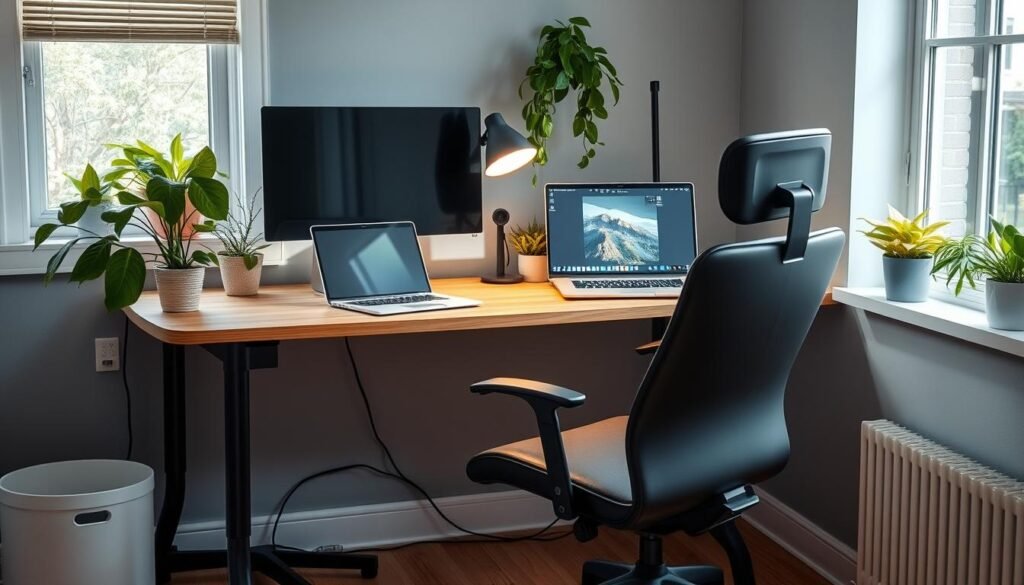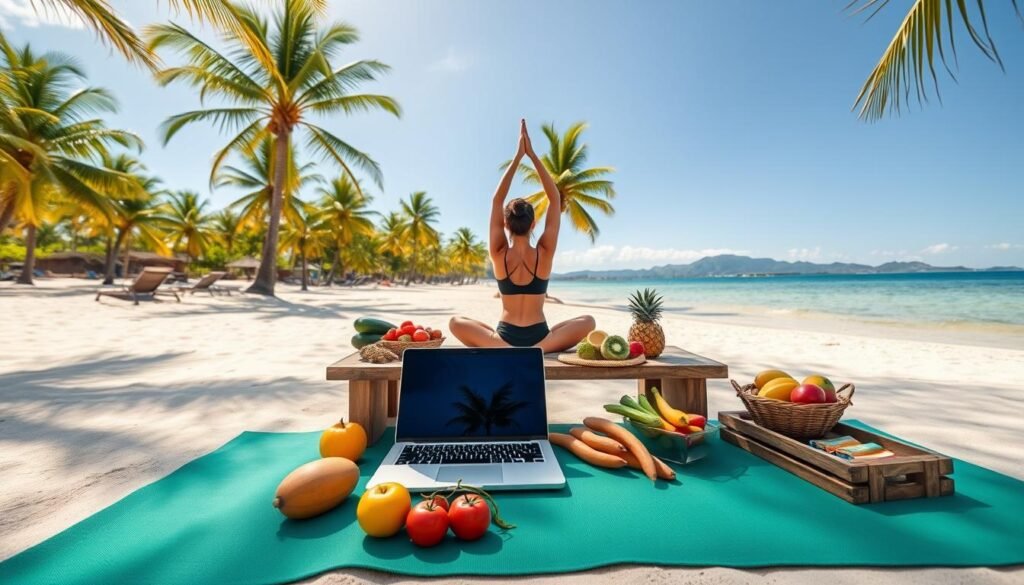As an Amazon Associate, I may earn from qualifying purchases. This helps support our blog at no extra cost to you.
The Nomadic Challenge: Staying Fit Without a Gym
For digital nomads working remotely, gyms are not always easy to find. This leads many to try gym-independent fitness routines. These routines keep them active and fit, so they can make the most of their nomadic lifestyle.
The Bodyweight Workout Advantage
Bodyweight exercises are perfect for nomads, there’s no need for gym equipment. Exercises like push-ups, squats, and planks are great for staying fit.
They help build strength, endurance, and coordination; which are important for someone who’s choosing a lifestyle full of traveling. Programs like Ripped30 show that bodyweight workouts can really improve fitness.
Yoga: Flexibility and Strength for Nomads
Yoga for nomads is more than a workout, it’s a must for those who travel a lot and spend many hours hunched over a laptop. Yoga keeps muscles flexible and helps with posture.
It also reduces stress, which is vital for nomads. Many follow free online videos or programs, or join local classes, to keep practicing yoga wherever they are.
Exploring Local Fitness Opportunities
Doing local park workouts and community activities is good for health. It also helps you get to know the local culture in that area which is a plus. Activities like hiking, swimming, or cycling are fun ways to stay fit.
Many digital nomads find these activities make staying fit more fun. It keeps workouts from feeling the same every day and prevents you from feeling burnt out.

Adopting Ergonomic Remote Work Practices
For digital nomads, ergonomic remote work is key to staying healthy and productive. Setting up a good remote work space is important. It makes you feel comfortable and work better.
Good posture starts with a space that supports your body. An ergonomic chair and an adjustable laptop stand help a lot. They prevent neck and back pain from sitting too long.
Remember, adopting proper digital nomad posture goes beyond just sitting right. It’s about creating an environment that shifts with your body’s needs throughout the day.
Also, keep your computer screen at eye level. Make sure your keyboard and mouse are easy to reach. Using an external keyboard and mouse helps a lot, too.
- Follow the 20-20-20 rule to offset digital eye strain.
- Integrate physical movement into your routine to avoid the sedentary trap.
- Invest in noise-cancelling headphones to maintain focus in various remote work environments.
Having a routine is key for remote work. Set work hours to keep work and personal life separate. Good internet is also important for working well with others.

Using ergonomic accessories can make you more comfortable. Portable lumbar support pillows are great for working in different places. Making small changes to your space can really help your work and health.
Strong social connections and quiet time are as important as your workspace. A good digital nomad life includes a healthy workspace and a good daily routine. This way, you stay healthy and happy.
Nourishing Nutrition: Eating Well on the Road
Digital nomads travel the world, they need to eat well to stay healthy. Eating whole foods helps them stay sharp and full of energy.
Whole Foods Over Processed Meals
Choosing whole foods is key, foods like nuts and fish are good for the brain. Leafy greens and fruits give important vitamins and minerals.
Strategic Eating: Timing and Composition
For those always on the move, eating right is crucial, a protein-rich breakfast starts the day well. Carbs at lunch keep energy up, these are just a few small steps you can take in staying healthy.
Plan meals with your day’s activities in mind. This helps you perform better and recover faster.
Local Markets: A Guide to Fresh Finds
Visiting local markets is great for digital nomads who are interest in exploring new places and learning more about the area. It supports local economies and lets you try fresh, healthy foods. It also connects you to the places you visit.
Adding local ingredients to your meals is fun and healthy. Don’t forget to drink plenty of water, too. Coconut water is a tasty way to stay hydrated.
Health expert Kara Mosesso says eating well is key to staying healthy. It helps prevent many diseases.
Digital nomads should mix healthy eating with trying new foods. This way, they enjoy their travels while staying healthy.

Mental Well-being: Staying Grounded While Globetrotting
Being a digital nomad means always being on the move and this means we have to adapt to our new surroundings. It’s as important to keep your mind healthy as your body. Mindfulness for travelers and gratitude journaling helps you stay calm and focused, no matter where you are.
Meditation and Mindfulness Practices
Meditation and mindfulness are great for digital nomads as they help you deal with stress and stay focused. You can find online resources for staying fit on the road that include meditation practices you can do anywhere, anytime.
Gratitude Journaling for Positive Perspective
Writing in a gratitude journal is a simple way to stay positive. It helps you think about the good things in your life. This practice makes you happier and more satisfied over time.
The Benefits of Mindful Communities
Being part of a mindful community is very helpful because you can talk to others who understand your life as a nomad. These groups offer support and friendship, making your journey better.
In summary, digital nomads can stay mentally strong by being calm, positive, and connected. Mindfulness, online resources, and gratitude journaling can be great help for when you face the challenges of living and working on the move.
Strategies for Restful Sleep in New Time Zones
For digital nomads and frequent travelers, dealing with jetlag and finding restful sleep for nomads can be tough. It’s key to know and use good sleep strategies for travelers. This helps keep you productive and healthy as you travel to different places.
- Avoid caffeine and heavy meals: Don’t drink caffeinated drinks or eat big meals six hours before bed as this helps keep your sleep cycle smooth.
- Adapt to the new time zone: Start changing your sleep schedule a few days before you travel. This helps you adjust to the new time zone better.
- Limit exposure to screens: Turn off phones, laptops, and TVs at least four hours before bed. This cuts down on blue light and helps you sleep better.
Also, making your sleep area better is very important:
- Use sleep accessories: Good neck pillows, eye masks, and headphones make your sleep area feel more like home, allowing you to sleep better.
- Manage light exposure: Get some natural light in the morning, this helps your body get into a sleep-wake cycle. Then, avoid light in the evening to keep melatonin levels up for good sleep.
Persisting in these habits helps fight jetlag and builds a strong sleep routine, wherever you are.
Adding foods like almonds, bananas, and chamomile tea to your diet can also help you sleep better while traveling.
Every strategy helps fight jetlag and keeps your sleep regular. This means you’ll be well-rested and ready for your adventures. By focusing on these sleep tips, travelers can make their rest time better. This leads to more fun and productive trips.
Practical Fitness Equipment for the Traveling Professional
Keeping fit is key in today’s fast world, even for digital nomads. They often move around a lot, making it hard to stay active. To stay fit, picking the right portable fitness equipment and eating healthy travel snacks are musts.
Resistance Bands: A Portable Gym
Resistance bands are a top choice for portable fitness equipment because they’re light and fit in any bag. They help with strength and flexibility, great for travelers who don’t have access to full gyms or someone with limited time to exercise.
Laptop Stands and Portable Ergonomic Aids
Good posture is key for work, and laptop stands help a lot. They keep your back straight and prevent pain. These are key digital nomad accessories for staying healthy at work.
Investing in a Reliable Water Bottle and Blender
Drinking water and eating right keeps you going. A good water bottle and blender are essential. They help you make healthy meals anywhere.
Smart Snacking: Healthy Options for Nomads
Choosing the right healthy travel snacks is important. Go for nuts, fruits, or whole-grain bars. They’re nutritious and easy to carry.
Using these tools can really help digital nomads stay healthy. With the right portable fitness equipment and digital nomad accessories, and healthy snacks, staying fit on the go is easier.
Health and Fitness for Digital Nomads: Building a Routine
For digital nomads, staying healthy is key. They need to keep up with fitness routines, even when traveling. This helps keep their body and mind strong, no matter where they are.
Starting a routine is easy with online tools made for nomads. YouTube has great videos, like those by Caroline Girvan. She offers daily 1-hour workout videos that can be done anywhere. This shows how nomads can stay fit anywhere.
- Start with small workouts using things like canned beans or milk cartons as weights. This makes it easy to exercise without special gear.
- Use the outdoors for exercise. Running on the beach or using outdoor gyms in parks is free and fun.
- Use travel yoga mats and resistance bands. Brands like Veick make these items easy to carry and use on the go.
- Try out free gym trials in the area you’re staying. This can give you a place to work out and meet new people.
Staying hydrated and eating well is also important. Drinking water all day is key, even more so in hot places. Eating whole foods and the right amounts helps keep you going all day.
Remember: “Maintaining fitness isn’t just about movement; it’s about integrating health into every choice we make while traveling.”
Being a digital nomad means finding easy ways to stay fit and simple routines, having apps for meditation or tracking workouts can help a lot. These habits are crucial for keeping healthy while traveling.
Preventive Measures: Avoiding Common Nomad Health Pitfalls
Living as a digital nomad comes with special digital nomad health challenges. Traveling a lot and working in different places can be hard on your muscles and bones. But, there are ways to lessen these problems and stay healthy.
Many digital nomads don’t think about the dangers of sitting too long and bad workspaces. Workspaces on the go are not always good for your body. But, there are things you can do to stay safe:
- Regular stretching and mobility exercises help maintain flexibility and reduce stiffness.
- Incorporating short, frequent breaks during work hours can prevent muscle fatigue and strain.
- Using portable ergonomic devices such as adjustable stands for laptops can align screens at eye level to avoid neck strain.
It’s also important to manage your health when you’re traveling, digital nomads should be prepared and carry a health kit as well as have good travel insurance. Knowing where to find good healthcare and understanding your insurance can help you immensely when trying to staying healthy while traveling.
Proactive health management is crucial; integrating regular check-ups and preventive care into one’s travel schedule ensures continuity of care and peace of mind.
Starting new adventures is exciting, but keeping healthy is important too. By taking care of your body, digital nomads can better enjoy their travels. Remember, taking care of your muscles and bones is not just about fixing problems. It’s about staying healthy for your lifestyle.
Embracing Local Health Resources and Online Services
For digital nomads, staying healthy while traveling is key. Accessing healthcare while traveling shouldn’t be scary. In fact, many digital nomads struggle to stay healthy due to constant change.
Using local healthcare and online services can help a lot. This is more important as virtual health services for nomads grow.
More people are working remotely, leading to a big need for flexible healthcare. Telemedicine is a big help, letting nomads talk to doctors online. This is great for finding treatments that are hard to get locally.
Online physical therapy is also a big plus. It helps keep you fit, even when you can’t find a local therapist.
A large portion of digital nomads value their networks for health tips. Being ready and joining expat groups can help find good doctors anywhere, this is how people like AIContentfy’s founder grow their online presence.
Being proactive is key to using healthcare services well. Many nomads have trouble sleeping and dealing with local health systems. Resources like medical phrasebooks and virtual health services for nomads are very helpful.
Using apps and joining online communities are options for those who need a little extra help, the goal should always be a healthy and happy lifestyle.
FAQ
How can a digital nomad maintain health and fitness while traveling?
Digital nomads can stay healthy and fit by doing exercises without a gym. They should work in a way that’s good for their body. Eating well and taking care of their mind is also key.
They can use simple fitness gear and make a routine. It’s important to take care of their health and find local and online health services.
What are some effective bodyweight exercises for digital nomads?
Digital nomads can do push-ups, squats, planks, lunges, and burpees. These exercises need no equipment and can be made easier or harder. They can be done anywhere.
How can digital nomads ensure they’re eating well while on the road?
Digital nomads should choose whole foods over processed ones. They should plan their meals and visit local markets for fresh ingredients. Eating the right amount and variety of foods is important.
What are some ways to practice mindfulness and maintain mental health while traveling?
Digital nomads can meditate and do mindfulness exercises every day. Keeping a gratitude journal and joining mindful communities are good ideas. This helps them stay mentally healthy while traveling.
Why are sleep strategies important for digital nomads, and what are some tips?
Sleep is crucial for digital nomads to rest well in different places. It helps manage jetlag and keeps them healthy and productive. They should sleep at the same time every day and use tools like headphones or masks.
Having a relaxing routine before bed is also helpful.
What portable fitness equipment should a digital nomad consider packing?
Digital nomads should pack resistance bands, a yoga mat, and a laptop stand. A good water bottle and a portable blender for smoothies are also good. These items are light and versatile.
How can digital nomads build and maintain a fitness routine?
Digital nomads should plan their workouts and start with easy exercises. They should get more intense over time. Being disciplined but flexible is key to keeping up a routine.
What preventive strategies can digital nomads use to avoid health pitfalls?
Digital nomads should stretch and do physical therapy to stay flexible. Using ergonomic gear helps prevent injuries. Regular health checks are also important.
How should digital nomads manage healthcare access while traveling?
Digital nomads should look up local health services and have travel insurance. Online medical services can also be helpful. Connecting with expat communities can lead to trusted healthcare providers.
How can a digital nomad maintain health and fitness while traveling?
Digital nomads can stay healthy and fit by doing exercises without a gym. They should work in a way that’s good for their body. Eating well and taking care of their mind is also key.
They can use simple fitness gear and make a routine. It’s important to take care of their health and find local and online health services.
Digital nomads can stay healthy and fit by doing exercises without a gym. They should work in a way that’s good for their body. Eating well and taking care of their mind is also key.
They can use simple fitness gear and make a routine. It’s important to take care of their health and find local and online health services.
What are some effective bodyweight exercises for digital nomads?
Digital nomads can do push-ups, squats, planks, lunges, and burpees. These exercises need no equipment and can be made easier or harder. They can be done anywhere.
How can digital nomads ensure they’re eating well while on the road?
Digital nomads should choose whole foods over processed ones. They should plan their meals and visit local markets for fresh ingredients. Eating the right amount and variety of foods is important.
Digital nomads should choose whole foods over processed ones. They should plan their meals and visit local markets for fresh ingredients. Eating the right amount and variety of foods is important.
What are some ways to practice mindfulness and maintain mental health while traveling?
Digital nomads can meditate and do mindfulness exercises every day. Keeping a gratitude journal and joining mindful communities are good ideas. This helps them stay mentally healthy while traveling.
Digital nomads can meditate and do mindfulness exercises every day. Keeping a gratitude journal and joining mindful communities are good ideas. This helps them stay mentally healthy while traveling.
Why are sleep strategies important for digital nomads, and what are some tips?
Sleep is crucial for digital nomads to rest well in different places. It helps manage jetlag and keeps them healthy and productive. They should sleep at the same time every day and use tools like headphones or masks.
Having a relaxing routine before bed is also helpful.
Sleep is crucial for digital nomads to rest well in different places. It helps manage jetlag and keeps them healthy and productive. They should sleep at the same time every day and use tools like headphones or masks.
Having a relaxing routine before bed is also helpful.
What portable fitness equipment should a digital nomad consider packing?
Digital nomads should pack resistance bands, a yoga mat, and a laptop stand. A good water bottle and a portable blender for smoothies are also good. These items are light and versatile.
Digital nomads should pack resistance bands, a yoga mat, and a laptop stand. A good water bottle and a portable blender for smoothies are also good. These items are light and versatile.
How can digital nomads build and maintain a fitness routine?
Digital nomads should plan their workouts and start with easy exercises. They should get more intense over time. Being disciplined but flexible is key to keeping up a routine.
Digital nomads should plan their workouts and start with easy exercises. They should get more intense over time. Being disciplined but flexible is key to keeping up a routine.
What preventive strategies can digital nomads use to avoid health pitfalls?
Digital nomads should stretch and do physical therapy to stay flexible. Using ergonomic gear helps prevent injuries. Regular health checks are also important.
Digital nomads should stretch and do physical therapy to stay flexible. Using ergonomic gear helps prevent injuries. Regular health checks are also important.
How should digital nomads manage healthcare access while traveling?
Digital nomads should look up local health services and have travel insurance. Online medical services can also be helpful. Connecting with expat communities can lead to trusted healthcare providers.
Digital nomads should look up local health services and have travel insurance. Online medical services can also be helpful. Connecting with expat communities can lead to trusted healthcare providers.

